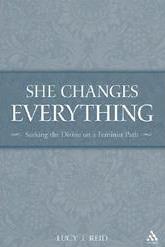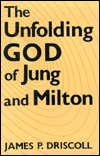"Grammatical nonsense but evidence of the theological desire to defeminize the Divine.”- Lucy Reid
For centuries, the Divine Feminine has been veiled by grammatical distortion and theological bias. This article exposes the subtle yet deliberate manipulation of sacred language—where Shekinah becomes neutered, and the Holy Spirit is stripped of Her feminine essence. But the truth cannot be silenced. The Adi Shakti rises through the cracks of patriarchal grammar, restoring Her presence in the hearts of seekers and the syntax of sacred revelation. The Word is Hers again.

"Rooted in the Hebrew Scriptures and flourishing in a patriarchal culture, Christianity developed its own negative attitudes towards women and the old religion of the Goddess. At times subtle, at other times brutal, the movement was away from partnership and towards hierarchy, from feminine images of the Divine to strictly masculine ones. Despite Jesus' radical inclusion of women as friends and disciples and his refusal to treat them as second-rate, sinfully sexual, or stupid, his followers quickly established as orthodox an all-male priesthood, a masculine Trinity, and a theologically expressed aversion to women...
And in Syria, where for four hundred years the word Holy Spirit was ruha, a feminine word derived from the Hebrew ruach, and where the Holy Spirit was described as Mother, complementing the parental imagery of Father and Son in the Trinity, the association of feminine language with heresy led authors to assign masculine gender to the word—grammatical nonsense but evidence of the theological desire to defeminize the Divine.”
Lucy Reid, She Changes Everything
Continuum, 2005, pages 32-33

"Fortunately, contemporary feminist scholarship provides a way to resolve Jung's difficulties and simultaneously deepen his basic insights. The feminine Wisdom or Shekinah the Old Testament says was with God from the beginning, feminist scholars point out, functions like the Holy Spirit or Paraclete of the New Testament, shares its symbolism of the dove, and is specifically referred to as God's 'holy spirit from above' in Wisdom 9:17-18.
Neglecting the similarity of Wisdom to the Paraclete did not of course begin with Jung. It began with those early Christians who sought to give intellectual respectability to Hebraic-Christian myth by reformulating it in terms of Hellenistic philosophy. The actual denigration of Wisdom, however, commenced before Christianity with Philo-Judaeus and other Alexandrian thinkers who, bowing to the era's intellectual fashions, concluded that feminine attributes lessened God. God's dignity, these philosophers insisted, required him to be all male no less than all good and powerful.
Anxious to protect the masculinity of their God, the church fathers declined to meld the Judaic wisdom figure with its natural successor, the Paraclete, which would have made one member of the Godhead feminine.”
James P. Driscoll, The unfolding God of Jung and Milton
University Press of Kentucky, 1992, p. 88
Note: If by 'gender' is meant grammatical gender, the gender of 'Holy Spirit' varies according to the language used. Thus the grammatical gender of the word 'Spirit' is masculine in Latin (Spiritus) and in Latin-derived languages such as English (Spirit) or German (Geist). In the Semitic languages such as Hebrew (Ruah), Arabic (Ruh, Rooh, Ruh-ul-Qudus), Aramaic (Ruha, Ruho) and its descendant Syriac (Ruha), it is feminine. In Greek it is neuter (Pneuma). When grammatical gender in a particular language is confused with physical gender, the Holy Spirit is thought of, within that language, as male, female or neither.
The Theological Desire to Defeminize the Divine: An Analysis of Lucy Reid's "Grammatical Nonsense"
Introduction
In her book, She Changes Everything, theologian Lucy Reid makes the striking claim that the linguistic shift in the gender of the Holy Spirit in early Christian texts is not merely a grammatical anomaly, but rather "grammatical nonsense but evidence of the theological desire to defeminize the Divine.”[1] This paper will analyze Reid's assertion, drawing upon historical, theological, and linguistic evidence to demonstrate the validity of her argument. We will explore the evidence for a feminine understanding of the Divine in early Christianity, the rise of a patriarchal theology that sought to masculinize God, and the linguistic acrobatics employed to achieve this end. This analysis will show that the defeminization of the Divine was a deliberate theological project, one that has had a lasting impact on Christian theology and practice.
The Feminine Divine in Early Christianity
The concept of a feminine aspect of the Divine was not foreign to early Christians. The Hebrew Scriptures, which formed the foundation of Christian thought, contain numerous references to a feminine divine presence. The most prominent of these is the figure of Wisdom (Sophia in Greek), who is described as being with God from the beginning of creation. In the book of Proverbs, Wisdom is personified as a female figure who was "brought forth" by God "at the first, before the beginning of the earth" (Proverbs 8:22-23). This feminine divine figure was not merely a poetic metaphor; she was understood as an active agent in creation and a source of divine guidance.
Furthermore, the Hebrew word for "spirit," ruach, is grammatically feminine. This linguistic fact had a profound impact on the early understanding of the Holy Spirit. In the early Syriac-speaking church, which was geographically and linguistically close to the Hebrew world, the Holy Spirit was consistently referred to with feminine pronouns. As Sebastian P. Brock, a leading scholar of Syriac Christianity, has shown, early Syriac texts, such as the Acts of Thomas and the writings of Aphrahat, explicitly refer to the Holy Spirit as "Mother.”[2] This is not a later theological development, but rather a reflection of the earliest understanding of the Holy Spirit's identity.
The Rise of Patriarchy and the Defeminization of the Divine
The suppression of the feminine Divine in Christianity was not a sudden event, but a gradual process that was driven by a confluence of historical and theological factors. The rise of a patriarchal social order in the Roman Empire had a profound impact on the development of Christian theology. As Christianity gained a foothold in the Greco-Roman world, it increasingly adopted the patriarchal values of the surrounding culture. This led to a growing discomfort with feminine imagery for God, which was seen as a threat to the established social order.
This theological shift is exemplified in the writings of Philo of Alexandria, a first-century Hellenistic Jewish philosopher who sought to harmonize Greek philosophy with Jewish scripture. Philo, influenced by the dualistic thinking of his time, viewed the feminine as inherently inferior to the masculine. He argued that "pre-eminence always pertains to the masculine, and the feminine always come short of it, and is lesser than it.”[3] This misogynistic worldview had a profound impact on early Christian theologians, who looked to Philo as a model for how to integrate their faith with the intellectual currents of their time. As James P. Driscoll notes, Philo and other Alexandrian thinkers "concluded that feminine attributes lessened God. God's dignity, these philosophers insisted, required him to be all male no less than all good and powerful.”[4]
"Grammatical Nonsense": The Linguistic Evidence
The theological desire to defeminize the Divine is most clearly seen in the linguistic changes that were made to the biblical texts. As Lucy Reid argues, these changes were not merely grammatical adjustments, but deliberate acts of theological censorship. The most striking example of this is the alteration of the gender of the Holy Spirit in Syriac translations of the Bible.
As we have seen, the Syriac word for "spirit," ruha, is grammatically feminine. In the earliest Syriac translations of the Gospels, the Holy Spirit is consistently referred to with feminine pronouns. However, in later translations, such as the Peshitta, the feminine pronouns are systematically replaced with masculine ones. This change is not random; it is most pronounced in passages where the Holy Spirit is described as having a teaching role, such as in John 14:26. This suggests that the translators were deliberately trying to erase any suggestion that the Holy Spirit could be a feminine figure of authority.
This linguistic manipulation is what Reid refers to as "grammatical nonsense.” The translators were not simply correcting a grammatical error; they were imposing a theological agenda on the text. By changing the gender of the Holy Spirit, they were attempting to erase the memory of a time when the feminine Divine was an accepted part of Christian belief and practice.
Conclusion
Lucy Reid's assertion that the linguistic shift in the gender of the Holy Spirit is "grammatical nonsense but evidence of the theological desire to defeminize the Divine" is amply supported by the historical, theological, and linguistic evidence. The early Christian church inherited a rich tradition of feminine divine imagery from its Jewish roots. However, with the rise of a patriarchal social order and the influence of Hellenistic philosophy, this tradition was gradually suppressed. The linguistic changes that were made to the biblical texts are a clear indication of this theological project. The defeminization of the Divine was not an accident of grammar; it was a deliberate act of theological censorship that has had a lasting impact on the Christian faith. By recovering the memory of the feminine Divine, we can begin to reclaim a more inclusive and holistic understanding of God.
References
[1] Reid, Lucy. "Grammatical nonsense but evidence of the theological desire to defeminize the Divine." She Changes Everything, Continuum, 2005, pp. 32-33.[2] Mowczko, Marg. "The Holy Spirit as Mother in Early Syriac Texts." Marg Mowczko, 31 Mar. 2023.
[3] Joyful Spirit Ministries. "The gender of God: God is more than words can say." Joyful Spirit Ministries, 22 Feb. 2016.
[4] Driscoll, James P. The unfolding God of Jung and Milton. University Press of Kentucky, 1992, p. 88.


